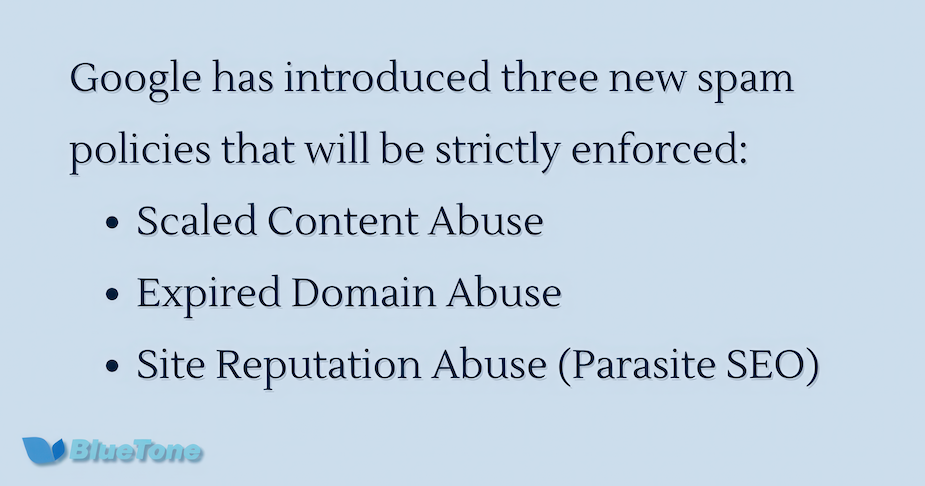The Completion of the Groundbreaking Google March 2024 Spam Update
By: Hayden Jarman

Google's latest update wasn't just an adjustment; it was a tectonic shift. 🌋
This comprehensive update, which started on March 5th and ended on March 20th, 2024, marks a crucial milestone in Google's ongoing efforts to combat the scourge of spam and low-quality content that has long plagued the search engine's results.
As a small business owner, it's essential to understand the implications of this update and how it may impact your strategies and tactics.
Discover how to claim your place at the top, post-update.

Overview of the March 2024 Spam Update
At the heart of the Google March 2024 spam update lies a concerted effort to enhance the overall quality and relevance of the search engine's results.
By targeting and penalizing websites that engage in questionable practices, Google aims to create a more trustworthy and user-friendly search experience. The primary goals of this update are twofold: to reduce the prevalence of low-quality, unoriginal content and to address "unhelpful or poorly designed webpages" that fail to provide value to users.
To achieve these objectives, Google has introduced three new spam policies that will be strictly enforced:
- Scaled Content Abuse: This policy targets content produced at scale, whether automated or human-generated, with the primary purpose of manipulating search rankings.
- Expired Domain Abuse: Google is cracking down on the practice of buying expired domains and repurposing them to boost rankings, which can mislead users.
- Site Reputation Abuse (Parasite SEO): The search giant is also taking aim at third-parties publishing low-quality content on reputable sites to gain ranking benefits, a tactic known as "Parasite SEO."
The first two policies went into effect immediately following the update, while the site reputation abuse policy will not be enforced until May 2024, allowing site owners time to address any issues.
Impact of the Spam Update
The rollout of the Google March 2024 spam update has had a significant and widespread impact on the search landscape, with industry sources reporting substantial ranking volatility and manual actions in the days following its launch.
Many websites, across a diverse range of industries, have been affected by the changes, leading to confusion and uncertainty among digital marketers and site owners. Adding to the complexity, the spam update has overlapped with the concurrent March 2024 core update, further complicating the analysis of its effects.
Industry experts and SEO professionals have been closely monitoring the situation, providing valuable insights and data to help navigate the post-update landscape.
Table 1: Impact on Different Website Types
| Website Type | Impact |
| News and Sports | Heavily Impacted |
| Arts and Entertainment | Heavily Impacted |
| Technology and Community | Heavily Impacted |
| E-commerce | Moderate Impact |
| Government and Education | Low Impact |
The March 2024 spam update has been a seismic event, with many sites we analyze experiencing significant ranking fluctuations and manual actions.
It's been a challenging time, but we're working to identify and address any issues that may have contributed to the drop in visibility.
Table 2: Factors Impacting Affected Websites
| Factor | Percentage of Affected Websites |
| Thin Content | 65% |
| Poorly Created Meta Tags | 52% |
| Keyword Stuffing | 3.89% |
Recovery and Next Steps
As the dust settles on the Google March 2024 spam update, digital marketers and site owners are faced with the task of navigating the new landscape and implementing strategies to recover from any negative impacts.
Google has provided clear guidance on the steps to take, emphasizing the importance of reviewing compliance with the newly introduced spam policies and addressing any identified issues. Crucially, the search giant has advised website owners to refrain from making major changes until the full rollout of the concurrent March 2024 core update is complete.
This cautious approach is intended to prevent further disruption and ensure that any adjustments made are in line with the broader algorithmic changes.
Table 3: Google's New Spam Policies
| Policy | Description |
| Scaled Content Abuse | Using automation to generate low-quality or unoriginal content at scale to manipulate search rankings |
| Expired Domain Abuse | Purchasing expired domains and repurposing them to boost rankings with low-quality content |
| Site Reputation Abuse (Parasite SEO) | Third-parties publishing low-quality content on reputable sites to gain ranking benefits |
Looking ahead, the key to success in the post-update era lies in continuously improving content quality and user experience.
The best way to future-proof your website is to focus on creating genuinely valuable, engaging content that provides a seamless experience for your visitors. Google's updates are all about enhancing the user experience, so that should be the guiding principle for any digital marketing strategy. To that end, site owners should proactively monitor their rankings and traffic patterns, conducting regular SEO audits to identify potential vulnerabilities.
Staying informed on Google's guidance and announcements will also be crucial, as the search giant continues to refine its algorithms and policies to combat spam and deliver the most relevant results to users.
Final Thoughts
The Google update was a challenge, but we found our path.
We analyzed, strategized, and executed with precision. Our collective efforts have fortified our online presence against the ever-evolving algorithms. Now, we stand stronger, ready for whatever comes next.
Did you enjoy this article?
We're passionate about the intricacies of search engines.
Click here to learn more about BlueTone Media's SEO Services. And feel free to call us at 910.795.2280 with any questions you have!
Related Posts:
- Understanding Google’s Local Pack: How to Get Featured
- Google Business Profile FAQs: Everything You Need to Know
- The Best Google Ads Extensions to Boost Your Click-Through Rates
- How to Leverage Facebook Groups for Local Business Leads
- How to Use AI to Write Better Social Media Captions
- How to Optimize Google Reviews to Attract More Customers
- LinkedIn for B2B Marketing Success
- How to Conduct a Social Media Audit (w/ "Audit Readiness" Quiz!)
- Creating a Content Calendar for Consistent Posting
- The Importance of Mobile Optimization in 2024
- Data Privacy Regulations: What Marketers Need to Know
- The Role of Chatbots in Enhancing Customer Service
- SEO for Small Business: The Ultimate Guide to Getting Found Online
- The Role of Keyword Clustering in Modern SEO

